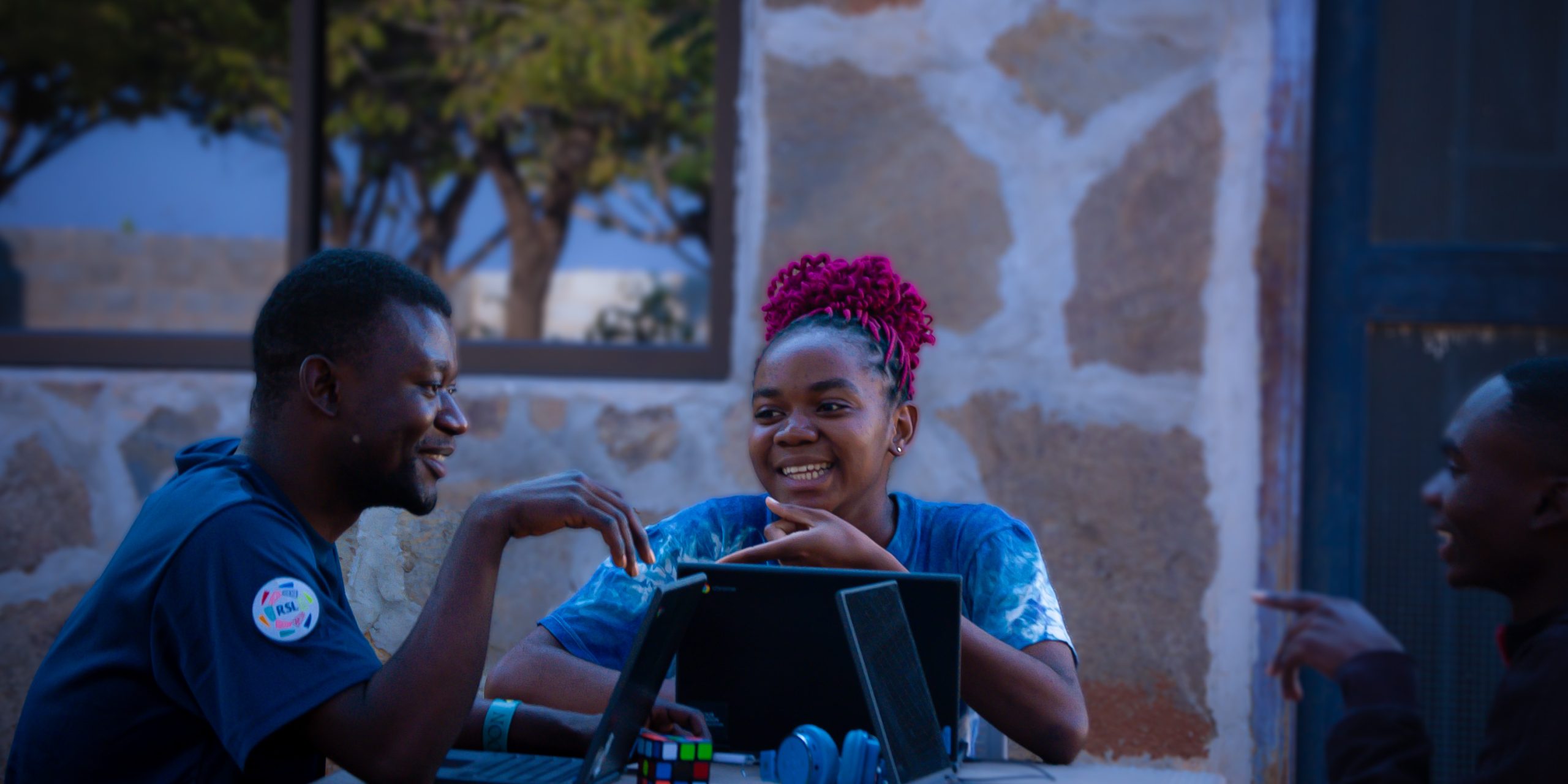Just before we flew back to the UK, I caught up with Mena to hear her reflections on how her first trip to Zambia – first visit to a developing country – had impacted her.
Helen: What were your overall observations about Zambia?
Mena: The first thing I noticed about Zambia was the atmosphere. Everything seemed chilled and relaxed. After a rather unexpected journey, I was met first by Damaris (one of Our Moon’s students) and her younger brother and sister, before getting into Kelvin’s truck to drive to Our Moon’s residential site. Playing reggae added to the vibe.
Driving through Lusaka, I was surprised that it was the capital city as it wasn’t as developed as other capital cities I had visited, especially driving past some of the compounds and seeing the contrasting ways in which people lived.
Generally, everyone I met was really friendly, especially when I went to the villages. They all respected me and my property. Some were a little quiet when we were interviewing them, but most were very welcoming. Our host families were amazing. It was my birthday during my stay in the first village and they prepared all day for the dancing and music. It made me feel very special.
One of the things that shocked me was that people feel less valued than the animals. For instance, there are different government departments for dealing with human death and animal death. If a human dies or is involved in a serious accident, many different organisations are involved and it can take a long while for help to arrive, especially in rural areas. On the other hand, if an animal is injured badly or killed in an accident, the rangers are there almost instantly to deal with it. Also, conservation organisations understandably believe animals should have a great habitat. They can, however, encroach on village settlements. This has made me much more conscious of human wildlife conflict issues.

While on the project, interviewing and living with the villagers, I learnt the reality of food insecurity, something I have never really given much thought to coming from a country and family where food is abundant, and where there is, relatively speaking, a lot of waste. Most of the villagers were just subsistence farmers, so very dependent on their one harvest of maize, Zambia’s staple food, to feed the family for a whole year. Elephants, for instance, can destroy homes, a whole year’s crop and trample humans just in one night, yet the villagers believe the elephants are given more rights within the country than them. While my interest is in animal conservation, I was surprised there wasn’t a better balance or, at least, that people don’t feel they have solutions to these problems or are given enough advice about what to do.
Helen: Tell us about your time at Our Moon
Mena: It was dark when I arrived, so it was difficult to get my bearings. But when I got out of the truck, I was greeted with a big hug from Sanky, Our Moon’s house parent. Gradually, I met the students, but I couldn’t really see them. I was taken to the chalet that would be my home while at Our Moon, sharing with the other four girls. That made it much easier to get to know the girls that evening, who were all excited to meet me. I even met Natasha, Justin’s sister who is now going to the local school. I have known her since I was nine years old, though we had never met before.
By the next day, I got to meet the boys and I would say that after two days, somehow, we had all become very close. I am not sure how it could have happened quite so quickly. Everyone was really lovely: students, teachers, Sanky. They made it very easy for me.
I was surprised how hard the students work and how motivated they are. If a teacher isn’t around for one of my classes at school, I don’t think we would necessarily get on with the work and nor would our teachers expect it. Mostly, we would go to the sixth form common room. But Our Moon sometimes deliberately leaves the students with work so they can figure out for themselves how they go about finding solutions to the work set. I found this very interesting as a way of encouraging them to learn for themselves and not be spoonfed, while also being impressed that all the students worked hard in this situation.
I loved Our Moon – I love the natural landscape and surroundings. At the same time, the standards of the buildings was very different from what I am used to and there is a lot of dust from the sandy soil. For the whole of my stay in Zambia, I couldn’t get used to constantly having dirty feet, despite washing them! I was surprised that toilets only flush using buckets of water, though I was told these were a significant improvement from the basic facilities they had before. And then I went to Mfuwe and there was only a hole for a toilet. That really blew my mind. I kind of got used to it and worked out a way to manage, but I shall be pleased to get home to my normal loo! Even bathing was a challenge. I was given a bucket with warm water but wasn’t exactly sure how to go about washing my hair and if I had managed to remove all the suds. Eventually, I worked out a method and adapted.
…after two days, somehow, we had all become very close. I am not sure how it could have happened quite so quickly. Everyone was really lovely: students, teachers, Sanky. They made it very easy for me.
Helen: Moving onto a different subject, you had your hair braided while in Zambia. How did that go for you?
Mena: At first, I wasn’t convinced it was the right thing to do. I was concerned I could be accused of cultural appropriation. However, all the girls at Our Moon encouraged me to have it done and accompanied me to see Barbara who patiently put extensions into my white person’s hair – it took four hours! I loved the end result. I actually had it done twice. The first time, I had different colours – pink, green and yellow – added to my hair. The second time, I went for a uniform pinkish red colour. Wherever I went in Zambia, people would take pride in the fact that I was embracing their culture, so I needn’t have worried.

Helen: What were the key things you learnt from your visit in Mfuwe?
Mena: I think it shocked me how little people have and yet they had a sense of contentment. I think when I am home, I will find it difficult to tolerate some of the complaints people have. People live in mud huts – a bedroom for the whole family – maybe ten people of multiple-generations. Cooking is done on a brazier using charcoal or firewood, mainly outside though some had a sort of shelter for during the rains. The toilet and bathing areas were just little cubicles made from grass to obscure from view – no ceilings.
The more prosperous had more substantial houses – rectangular huts with roofing sheets – but still tiny for the numbers in the household.
Food insecurity again shocked me and how fragile life is with such limited food. They are totally reliant on their harvest so it helps explain their conflict with animals when they can leave a household starving overnight. It is so hard for me to imagine being pressed for food.

Helen: Since you were a child, you have wanted to be a vet. How has this trip changed that – either reinforced your desire or put you off?
Mena: What it has done is given me a unique insight into conservation and it has made me even more determined to be a vet. I also feel I have a much more realistic view of the conflict between humans and animals, rather than my previously child-like single dimensional view of wanting to protect animals at all costs without considering all the other issues. For instance, if you want to have a national park, then you need to recognise the need to support adequately the people who live within the park, while also protecting wildlife.
My dream is to work with exotic and endangered species. I feel really inspired by this experience to help to save entire species. It would be working with endangered species, like elephants, and their whole eco-system. It would really be doing the planet a favour while resolving the human wildlife conflict that I now understand better. For instance, while less poaching now takes place, the knock-on effect is that there are more elephants who are likely to destroy human’s crops. This situation needs careful management and a delicately balanced approach.
They told me there are very few vets in Zambia so I can see there is a huge demand for them and makes me feel very inspired.
Helen: Do you have any final words for others considering a visit to Zambia and/or Our Moon?
Mena: You will be in for an experience! Especially if you stay in a rural village. The food can lack variety in the village, with nshima for every meal – at Our Moon there is a greater choice. But I would say go and experience as much as you can including staying in the villages among locals. Celebrating my birthday in the village was very uplifting with drums being played from 07:00 until the evening. The ladies taught me to dance and some put on a performance pretending to be lions before soaking me in water! But it is also ok to go to the parks and feed elephants and walk cheetahs in a more managed way. Whatever you do, you can’t fail to be touched by your experience and grow your understanding of different ways of life and the issues people face in developing countries. It will really change your perspective on your own culture when you see how people manage on so much less.



